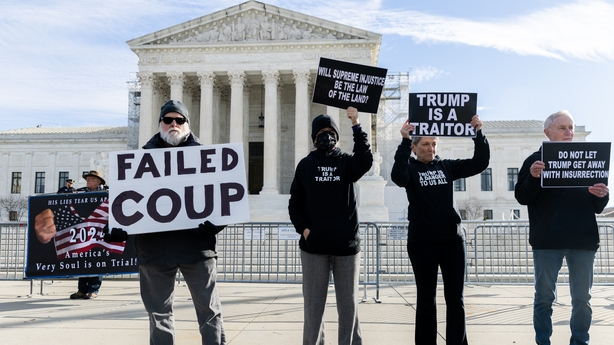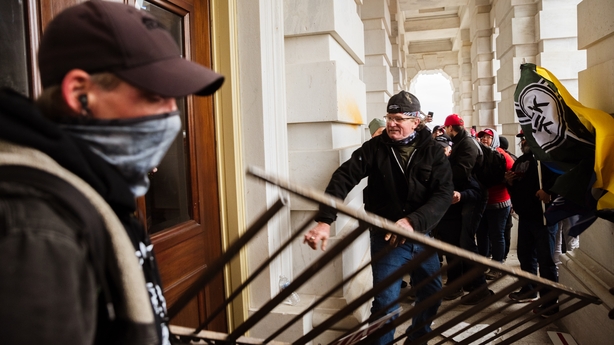Donald Trump appears to be heading for victory in the US Supreme Court as judges signalled their readiness to reject a decision to remove the former president from the ballot in Colorado for taking part in an insurrection during the 2021 Capitol attack.
The nine justices heard about two hours of arguments in Mr Trump's appeal of a 19 December ruling the state's top court to disqualify him from its Republican primary ballot on 5 March under the US Constitution's 14th Amendment after finding that he participated in an insurrection.
The ruling in the case promises major implications for the 5 November election.
Mr Trump, who did not attend the arguments, is the overwhelming front-runner for the Republican nomination to challenge Democratic President Joe Biden.
Section 3 of the 14th Amendment bars from holding public office any "officer of the United States" who took an oath "to support the Constitution of the United States" and then "engaged in insurrection or rebellion against the same, or given aid or comfort to the enemies thereof."
Justices - conservatives and liberals alike - expressed concern during the argument about states taking sweeping actions that could impact a presidential election nationwide.
They considered how states can properly enforce the Section 3 disqualification language against candidates, with several wondering whether Congress must first pass legislation to enable that.
The Supreme Court's six-three conservative majority includes three judges appointed by Mr Trump.
Conservative Chief Justice John Roberts told Jason Murray, the lawyer representing four Republican voters and two unaffiliated voters who sued to keep Mr Trump off the Colorado ballot, that if the judicial decision were to be upheld, other states would proceed with disqualification proceedings of their own against either Democratic or Republican candidates.
"It'll come down to just a handful of states that are going to decide the presidential election. That's a pretty daunting consequence," Justice Roberts said.

Anti-Trump forces have sought to disqualify him in more than two dozen other states - a mostly unsuccessful effort - over his actions relating to the Capitol attack on 6 January 2021.
But Maine has also barred Mr Trump from its ballot, a decision on hold pending the Supreme Court's Colorado ruling.
"I think that the question that you have to confront is why a single state should decide who gets to be president of the United States," liberal Justice Elena Kagan told Mr Murray.
"This question of whether a former president is disqualified for insurrection to be president again ... it sounds awfully national to me."
Conservative Justice Brett Kavanaugh - appointed by Mr Trump - focused on the impact to democracy if states could block candidates from their ballots.
"Think about the right of the people to elect candidates of their choice, of letting the people decide, because your position has the effect of disenfranchising voters to a significant degree," Justice Kavanaugh said.
Mr Murray offered a blunt reply: "The reason we're here is that President Trump tried to disenfranchise 80 million Americans who voted against him, and the Constitution doesn't require that he be given another chance."
Trump supporters attacked police and swarmed the Capitol in a bid to prevent Congress from certifying Mr Biden's 2020 election victory.
Mr Trump gave an incendiary speech to supporters beforehand, telling them to go to the Capitol and "fight like hell." He then for hours rebuffed requests that he urge the crowd to stop.

The 14th Amendment was ratified following the American Civil War of 1861-1865 in which seceding southern states that allowed the practice of slavery rebelled against the US government.
"The framers of Section 3 knew from painful experience that those who had violently broken their oaths to the Constitution," Mr Murray said, referring to the officials of the seceding states, "couldn't be trusted to hold power again because they could dismantle our constitutional democracy from within."
Justice Roberts asked Jonathan Mitchell, Mr Trump's lawyer, whether a state's top elections official could disqualify a candidate who comes forward and says he took the oath mentioned in the provision and engaged in an insurrection.
"If the candidate is an admitted insurrectionist, Section 3 still allows the candidate to run for office and even win election to office - and then see whether Congress lifts that disability after the election," Mr Mitchell said.
'I'm a believer' in Supreme Court - Trump
Mr Trump - in remarks in Florida - said he listened to the proceedings and "thought our arguments were very, very strong."
The former president, who sought to portray the case as part of a broader effort by Democrats to keep him off the ballot, indicated he felt disqualification was unlikely.
"I'm a believer in our country and I'm a believer of the Supreme Court," Mr Trump said.
The court last played such a central role in a presidential contest in 2000, when its landmark Bush v Gore decision handed Republican George W Bush the presidency over Democrat Al Gore.
The justices debated the applicability of an 1869 decision authored by then-chief justice Salmon Chase - albeit while he presided in a lower court - in determining how a Section 3 disqualification may now be enforced.
Justice Kavanaugh suggested to Mr Mitchell that the decision, which found that congressional legislation was necessary to enforce Section 3, is "highly probative" of the section's meaning.
The judges spent little time on 6 January or Trump's role in the events, though liberal Justice Ketanji Brown Jackson did press Mr Mitchell on whether the attack was an insurrection.
"Your point is that a chaotic effort to overthrow the government is not an insurrection?" Justice Jackson asked.
"This was a riot. It was not an insurrection," Mr Mitchell said.
"The events were shameful, criminal, violent, all of those things, but did not qualify as an insurrection as that term is used in Section 3."
Dozens of demonstrators gathered outside the courthouse for the hearing with some holding signs that read "Failed Coup," "Remove Trump" and "Trump is a Traitor".
Police set up barricades in the area.
Tonight, Nevada will hold a nominating caucus that Mr Trump is expected to win handily as he cruises towards his party's nomination to challenge President Biden in November.

